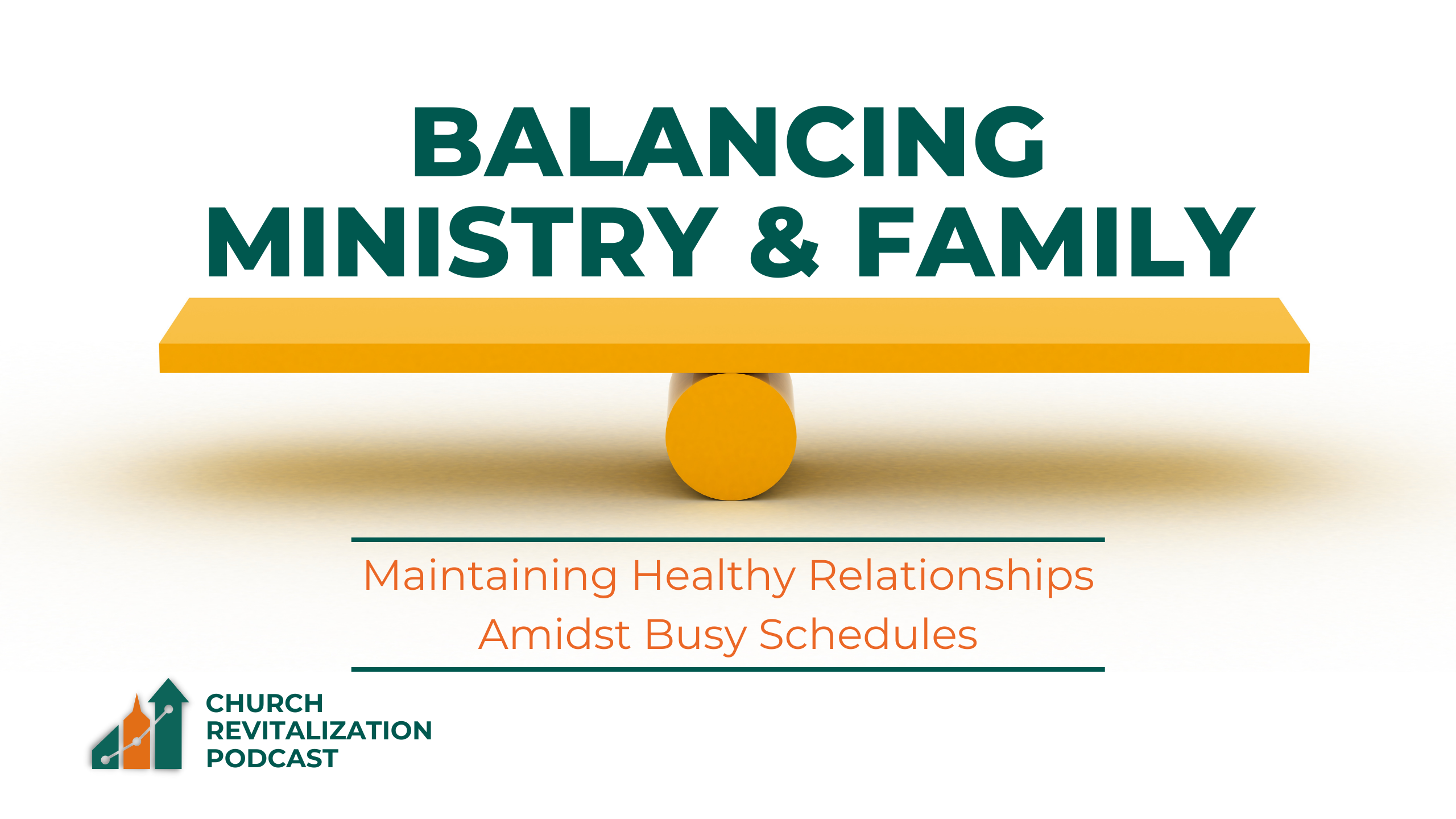The Church Revitalization Podcast – Episode 198
Leading a fulfilling life as a pastor involves navigating the delicate balance between ministry and family commitments. The weight of responsibility can feel especially heavy, especially if our churches are struggling. It’s not uncommon to find ourselves caught in a perpetual juggling act, trying to meet the demands of congregational growth while also tending to the needs of our own families. In the midst of these competing priorities, it is crucial to recognize the utmost importance of maintaining healthy relationships amidst our busy schedules.
Our families are not just an extension of ourselves; they are a reflection of our calling and ministry. They provide us with a support system, love, and grounding that fuels our passion for serving others. Neglecting these vital connections not only affects our personal well-being but can also hinder our ministry effectiveness.
As pastors, we are called to shepherd and care for our congregation, guiding them on their discipleship journey. However, if we neglect the relationships within our own families, we risk losing sight of the very essence of our ministry: to love and disciple those closest to us. Our spouses and children need our attention, affection, and presence. They need to know that they are cherished and valued beyond the demands of our ministry.
Balancing ministry and family is not an easy task. It requires intentionality, wisdom, and a deep understanding of our own priorities and values. In this article, we will delve deeper into the challenges faced by pastors in finding this delicate balance and explore practical strategies to ensure that both ministry and family thrive. We will discuss the importance of establishing priorities, setting boundaries, managing time effectively, communicating and collaborating with our loved ones, valuing quality over quantity when it comes to family time, embracing rhythms of rest and Sabbath, and allowing grace and flexibility in our pursuit of balance.
By taking proactive steps to maintain healthy relationships amidst our busy schedules, we can cultivate a life of fulfillment and purpose. We can lead by example, showing our congregations that a vibrant ministry is not solely measured by numerical growth but also by the strength of our own families. Together, let us embark on this journey of balancing ministry and family, understanding that the rewards far outweigh the challenges.
Subscribe below to never miss an episode.
Establishing Priorities
In the fast-paced world of ministry, it’s easy to get caught up in the constant demands and expectations. However, to maintain a healthy balance between ministry and family, it is crucial to establish clear priorities. Take a moment to reflect on your personal values and what truly matters to you in both your ministry and family life.
Your spouse and children need your love, support, and presence. Consider the values and principles you want to instill in your children and the type of marriage you aspire to cultivate with your spouse.
With a clear understanding of your values and aspirations in both ministry and family life, you can identify key areas that require attention. These areas could include spending quality time with your children, investing in your marriage, or being present for important family milestones. Remember, the goal is not to neglect your ministry responsibilities but to strike a balance that allows you to prioritize and nurture your family relationships alongside your pastoral duties.
Once you have identified your priorities, integrate them into your decision-making process. Before committing to additional ministry engagements or taking on extra responsibilities, evaluate whether they align with your established priorities. Be mindful of the potential impact on your family relationships and well-being.
Setting Boundaries and Managing Time
One of the key ingredients for maintaining a healthy balance between ministry and family is the establishment of clear boundaries and effective time management. Without intentional efforts in these areas, it can be challenging to allocate adequate time and energy to both aspects of your life. Here are some practical strategies to help you set boundaries and manage your time effectively.
Create a weekly schedule: Develop a well-structured weekly schedule that includes specific blocks of time dedicated to family activities and commitments. Treat these time slots as sacred and non-negotiable. By allocating dedicated family time, you ensure that you have regular opportunities to connect, engage, and nurture your relationships with your spouse and children.
Protect your family time: When family activities are scheduled, treat them with the same level of importance as any other commitment. Avoid scheduling meetings, appointments, or other obligations during these designated family times. Communicate with your congregation and colleagues, making it clear that these blocks of time are reserved for family and should be respected.
Delegation is key. Recognize that you cannot do everything on your own. Delegate tasks and responsibilities to trusted team members or volunteers within your church. Empowering others not only lightens your workload but also provides growth opportunities for them. Entrusting others with specific tasks allows you to focus on what truly requires your attention and expertise, both in ministry and family life.
Remember, setting boundaries and managing time effectively require discipline and consistency. It may take some trial and error to find a system that works best for you and your unique circumstances. Regularly reassess and adjust your boundaries and time management strategies as needed to ensure a healthy balance between ministry and family.
Communicating and Collaborating
Maintaining healthy relationships between ministry and family requires open and honest communication as well as collaborative decision-making. By actively involving your family members in discussions about ministry demands and collectively addressing challenges, you can ensure that everyone’s needs are acknowledged and met. Here are some key aspects to consider when it comes to communication and collaboration.
Foster an environment of open communication within your family. Regularly engage in conversations with your spouse and children about the demands and expectations of your ministry. Listen attentively to their thoughts, concerns, and needs. This transparency helps build trust and understanding, enabling everyone to navigate the challenges together.
Be sure to share your schedule. I’ve made this mistake more than once! Keep your family informed about your ministry schedule, commitments, and events–and give them plenty of advance notice. Share your calendar with your spouse and children, allowing them to see the times when you have commitments. This helps them understand your availability and adjust their expectations on your time accordingly.
Involve your family members in decision-making processes whenever possible. For instance, when considering ministry opportunities or commitments, seek their input and discuss the potential impact on your family’s schedule. By involving them, you ensure that decisions are made collectively, taking into account the well-being and needs of all family members.
I’ll be honest. This is an area of growth for me! But the biggest takeaway I’ve had is that when you make a mistake in communication–learn from it. When you know better, you can do better. Understand that learning to communicate well about your schedule is a continual process, and be sure to give yourself grace as you grow and learn.
Quality Time vs Quantity Time
When balancing ministry and family, it’s important to prioritize both quality time and quantity time. Ministry runs in seasons, and sometimes you’ll be able to give more time than others. But maximizing the quality of that time is important, all the time. Spending intentional, meaningful time with your spouse and children strengthens family bonds and creates lasting memories.
Regardless of the time you have available, be fully present both physically and mentally. Put away distractions such as phones, emails, and work-related thoughts. Engage in active listening and meaningful conversations with your spouse and kids.
Engage in activities that allow for genuine connection and bonding. Consider the interests and preferences of your family members. Whether it’s playing games, going for walks, cooking together, or engaging in hobbies, choose activities that everyone enjoys. These shared experiences create opportunities for laughter, learning, and building stronger relationships.
Mealtime offers a unique opportunity for connection and conversation. Find ways to connect, and maybe find unique traditions that work for you. Our family likes to eat together, and there are a few fun family-friendly YouTube accounts we like to watch in the evenings together. It might be strange to you, but these foster laughs, conversations, and interaction. There’s no right way to maximize evenings and mealtimes, but find something that causes you to be together–not in your own, secluded corners.
Remember, it’s about fostering genuine connection, being fully present, and prioritizing relationships. By making intentional efforts to spend quality time with your family, you cultivate an environment of love, trust, and support.
Rhythm and Sabbath
In the pursuit of balancing ministry and family, it is essential to prioritize rest, rejuvenation, and the practice of Sabbath. Incorporating regular rhythms of rest into your schedule not only promotes your well-being but also strengthens your ability to serve both your ministry and family effectively.
Embrace the importance of rest. Recognize that rest is not a luxury but a necessity for your physical, emotional, and spiritual well-being. Understand that taking time for yourself and your family is not selfish but a means to recharge and refocus. Make rest a priority and commit to incorporating it into your regular routine.
Observe the Sabbath. Like Jesus said, Sabbath was made for man–not man for the Sabbath. That means God had your best interest at heart when He created the Sabbath, and pastors are not exempt from that spiritual need. The Sabbath is a time for spiritual nourishment, reflection, and connection with God and your family. Pick a consistent day to engage in activities that bring you closer to God, such as Scripture reading and prayer. Allow the Sabbath to be a time of restoration, deepening relationships, and recharging your spiritual batteries.
By incorporating regular rhythms of rest and observing the Sabbath, you not only nurture your own well-being but also create a culture of balance within your family and ministry. These practices remind you and your loved ones that you are more than just the roles you fulfill, but individuals deserving of rest, rejuvenation, and spiritual nourishment.
Grace and Flexibility
Balancing ministry and family is an ongoing journey that requires grace and flexibility. There will be seasons where the demands of ministry may intensify, and adjustments need to be made. During such times, it’s essential to extend grace to yourself and your family. Recognize that perfection is not the goal but rather a commitment to consistently prioritize relationships amidst the ebb and flow of ministry life.
Adapt and adjust your priorities as needed, always keeping your relationships at the forefront. Embrace the understanding that there will be times when certain aspects may require more attention, but it should never be at the expense of neglecting your family. Emphasize open communication, reassess priorities regularly, and make necessary adjustments to ensure a healthy balance.
Maintaining healthy relationships amidst busy ministry schedules is essential for both personal well-being and ministry effectiveness. By establishing clear priorities, setting boundaries, communicating openly, dedicating quality time, embracing rest and Sabbath practices, and embracing grace and flexibility, pastors can achieve a harmonious balance between ministry and family.
Remember, a well-balanced life brings fulfillment, joy, and lasting family bonds. As pastors, let us prioritize and nurture our family relationships, knowing that they are an integral part of our ministry journey.
BONUS: Watch this episode on YouTube.


Scott Ball is the Vice President and a Lead Guide with The Malphurs Group. He lives in East Tennessee with his wife and two children. (Email Scott).

